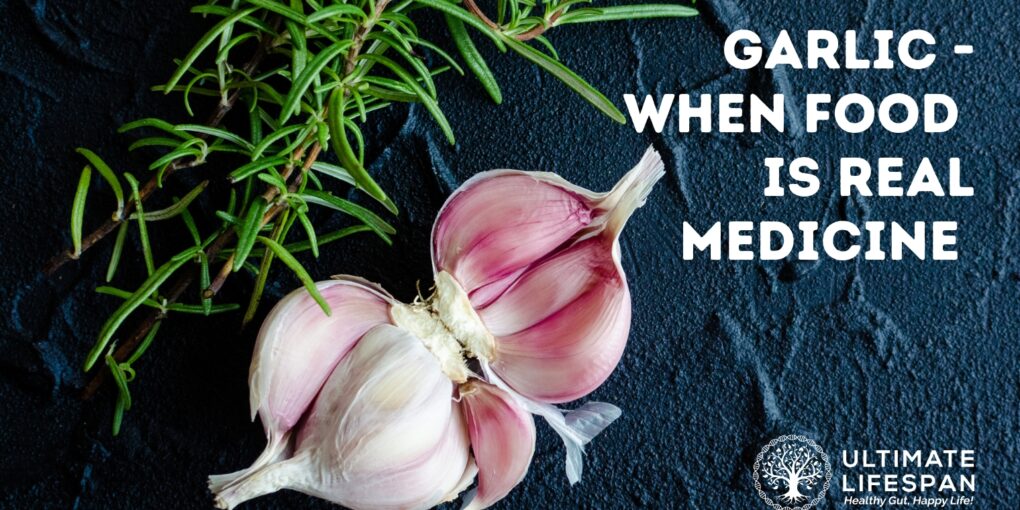Garlic: Food as Medicine
Garlic! Where do we even begin? Did you know that garlic was found in the tomb of King Tut, preserved for over 3,000 years? This ancient clove has been valued for millennia, not just for its bold, pungent flavor but also for its impressive health benefits. Whether it’s warding off infections, boosting your immune system, or adding a delicious kick to your favorite dish, garlic has earned its reputation as a powerhouse in both the kitchen and the medicine cabinet.
Let's dive deeper into the many ways garlic can transform your health—and your meals.
Nature’s Potent Healer
Garlic is a member of the Allium family, which includes onions, leeks, and shallots, but it's truly in a league of its own when it comes to medicinal properties. Packed with sulfur compounds like allicin, garlic has been used traditionally in cultures worldwide for its healing powers. These compounds not only give garlic its strong smell but also contribute to its long list of health benefits.
1. Immune Booster
Feeling a cold coming on? Garlic could be your new best friend. One of the most well-known benefits of garlic is its ability to boost the immune system. Studies show that garlic can help reduce the severity of colds and shorten the length of flu symptoms. It stimulates the production of white blood cells, which are your body's front-line defense against infections.
For centuries, garlic has been used to treat colds, flu, and even sore throats. A potent antiseptic, antibacterial, and antimicrobial agent, garlic can help combat a wide variety of pathogens. In fact, garlic's natural antiviral properties make it a go-to remedy for respiratory infections.
So, the next time you feel that tickle in your throat or the beginnings of a sniffle, think about adding a little extra garlic to your meals.
Recipe for health: to make a soothing lemon, raw honey, and garlic mix for sore throats, start by finely chopping or crushing 2-3 cloves of fresh garlic and letting them sit for 10 minutes to activate the beneficial compounds. Mix the garlic with the juice of one lemon and 1-2 tablespoons of raw manuka honey, stirring well. For a stronger effect, you can also add a pinch of cayenne pepper. Take a teaspoon of this mixture every few hours to help soothe your throat and support your immune system. Store any extra in the fridge for up to two days.
2. Heart Health
Garlic’s benefits don’t stop at the immune system—it’s a true champion for your heart. Research shows that garlic can help lower cholesterol levels, specifically reducing LDL (“bad” cholesterol) while increasing HDL (“good” cholesterol). This helps prevent the buildup of plaque in your arteries, lowering your risk of heart disease and stroke.
Even more impressively, garlic is known to help regulate blood pressure. Studies suggest that consuming garlic regularly can help reduce both systolic and diastolic blood pressure, making it a natural ally for those battling hypertension.
Also, garlic has been linked to healthier blood sugar levels. For those managing type 2 diabetes or insulin resistance, garlic could offer an extra layer of support by improving how your body metabolizes glucose.
3. Digestive Health and Vermifuge Power
Garlic’s strong antimicrobial properties make it a perfect ally for gut health. If you've ever heard someone say that garlic helps “cleanse” the body, there's actually some truth to that. Garlic can help fight harmful bacteria, fungi, and parasites in the digestive system.
In traditional medicine, garlic is often used as a natural vermifuge, meaning it can help expel parasitic worms and other harmful organisms from the intestines. It's a powerful natural remedy for maintaining digestive health, supporting the growth of good bacteria in the gut, and keeping your intestinal flora in balance. This is why garlic is a star ingredient in many herbal formulations aimed at promoting digestive wellness, like our Ultimate Digestive Health formula.
4. Antibacterial and Antimicrobial Properties
Garlic has been used as a natural antibiotic for centuries, long before modern medicine developed synthetic antibiotics. A special variety of garlic caller Bogatyr in Russia is considered to be nature's penicillin. Its antibacterial and antimicrobial properties have been shown to fight a wide range of harmful bacteria and fungi. Garlic contains compounds that disrupt the cell walls of harmful microbes, making it harder for them to survive and thrive.
It’s not just good for internal health either. Garlic can be used topically as an antifungal agent, especially for skin infections like athlete’s foot. Simply crush fresh garlic and apply it to the affected area, though be cautious—garlic can be quite potent and may cause skin irritation if left on for too long!
How to Maximize Garlic’s Benefits
Not all garlic is created equal, and how you prepare it can significantly impact its health benefits. Here are a few tips to get the most out of your garlic:
Crush or chop before using: Crushing or chopping garlic activates the allicin, the compound responsible for many of its health benefits. Let the garlic sit for about 10 minutes after chopping to allow the allicin to fully develop before cooking.
Use it raw when possible: While cooked garlic is still beneficial, raw garlic contains the highest levels of allicin. If you can tolerate it, try incorporating raw garlic into salad dressings, salsas, or even blended into a smoothie.
Don’t overcook: High heat can destroy allicin, so avoid overcooking garlic. Add it towards the end of cooking to preserve its medicinal properties.
Best Garlic Varieties for Health
Not sure which garlic to choose? There are many varieties of garlic available, each with its own unique flavor profile and benefits. Here are a few of the best types of garlic for both culinary use and health:
Hardneck Garlic: Known for its complex flavors, hardneck garlic is easier to peel and contains more allicin than softneck varieties, making it a great choice for medicinal purposes. Varieties like Rocambole or Purple Stripe are excellent.
Softneck Garlic: This type of garlic has a milder flavor and is the kind you’ll typically find at the grocery store. Softneck garlic stores longer, making it convenient for everyday cooking, but it tends to have less allicin compared to hardneck varieties.
Black Garlic: This fermented version of garlic has a sweet, umami flavor and is packed with antioxidants. While it has less allicin than raw garlic, black garlic is still a great option for boosting immune function and supporting heart health.
A Delicious, Medicinal Ingredient
Garlic’s health benefits are as versatile as its culinary uses. Whether you’re using it to fend off a cold, support your digestive health, or maintain a healthy heart, garlic is a powerful and natural remedy. And let’s not forget—it makes everything taste better. From pastas to stir-fries, soups to marinades, garlic brings an undeniable depth of flavor to your meals.
So the next time you chop up a clove of garlic, remember that you’re not just enhancing the taste of your dish—you’re boosting your health in ways that have been celebrated for thousands of years.


